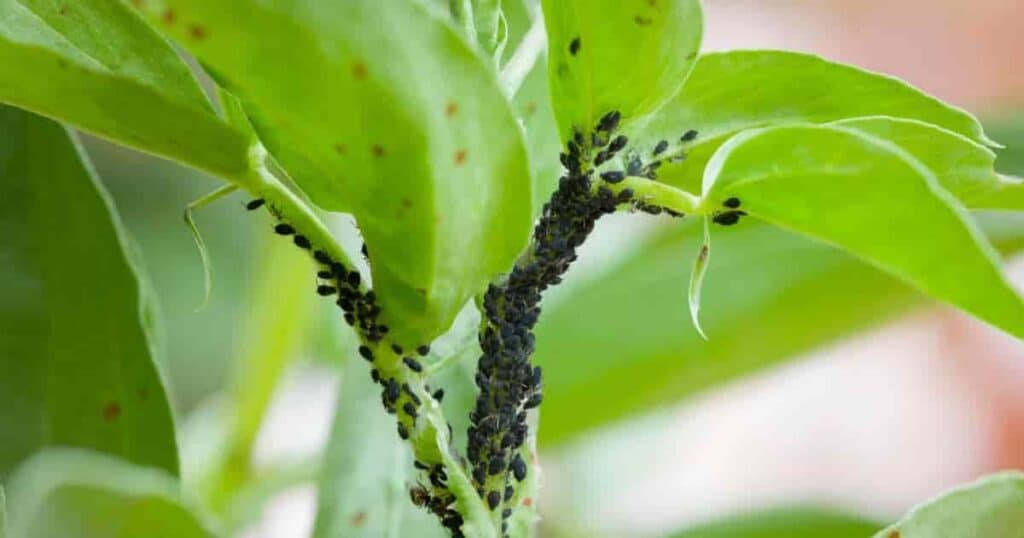Aphidoidea, or aphids, are small insects that feed by sucking on plant sap. These soft-bodied creatures are “true bugs” because they are equipped with a specialized mouth solely to withdraw liquid from leaves, plants, and flowers.
Aphids love to prey on crops such as asparagus, cowpeas, and melons. They also attack beans. However, beans are prone to be infested by the Aphis fabae Scopoli or the Black Bean Aphid.

The faster you can identify the aphid, the quicker you can stop them from multiplying and causing more significant harm. For many of these cases, time is of the essence.
What Are Black Bean Aphids?
The black bean aphid is a variation of the aphid species. They are black, soft-bodied insects with antennae and cornicles. Aphids are usually visible on plants.
Along with attacking beans, this variation of the aphid is also a pest of celery, sugar beets, and potatoes.

Related: Tips on How To Get Rid of Aphids Naturally
The black bean aphid, as its name describes, is mostly black or dark green. The insect has a soft, broad, and plump body. Some have wings, and some do not. The variation with wings is usually more slender than their counterparts.
Although the mere presence of one aphid is not likely to cause significant harm to your plant, the insect is usually seen on garden plants in great numbers. The Black bean aphid multiplies quickly, so it is vital to handle black bean aphids at first sight.
What Damages Does The Black Bean Aphid Cause?
Black bean aphids are harmful to plants. These insects cause direct feeding damage by sucking plant juices and necessary nutrients from your plant. Look for dense clusters feeding on tender new growth.
As they feed, they leave behind honeydew or a sticky, sugar-rich substance that makes a breeding ground for various fungi, such as sooty dew.

They can also cause indirect damage by spreading diseases such as the Bean Common Mosaic Virus (BCMV) and more.
The sap that is sucked out of plants by the Black bean aphid is a nutritional component of the plant and creates an imbalance of the plant’s growth hormones, leading to the plant’s death or distortion of the plant.
The harm caused by these critters can be detrimental to your garden. The aphids may begin small in number, but they will multiply and increase in size within a few days. What was a slight problem may quickly become a big problem.
It’s also important to note that these aphids prefer host plants like runner beans, french beans, broad beans, and nasturtiums.
In the garden, they like viburnum, dahlia, and crops like beet and celery.
Knowing the problems that Aphids can cause to your plants and garden is only part of the solution. Being able to stop them is the next step.
How Do You Get Rid Of Black Bean Aphids?
If black bean aphids or any other insect has infiltrated your plants and gardens, it may be time for you to take action.
It is suggested that you take swift and quick action, as the longer you allow these pesky creatures to suck on your greenery, the more harm they will do.

Fortunately, there are many ways to keep these insects at bay. You may go to your home and garden shop and purchase a ready-made concoction, or you may decide to make one yourself.
Chemical Solutions
Pesticides are a definite method of getting rid of aphids. Insecticides such as:
- Organophosphate
- Carbamates
- Pyrethrum and pyrethroids
.. .and more have an active ingredient that helps solve your problem.
Some of these chemical compounds can be dangerous to humans and livestock, so do your research.
Natural Solutions
The best natural and organic way to rid your plant of Aphids, including the Black Bean Aphid, is by using a simple soap solution.
This solution is also a great option if you’re looking for a more environmentally safe solution. The soap solution does not kill the insect with poison; it causes a physical reaction to the exterior body of the Mealybug.

Insecticidal soap works for these critters because they are soft-bodied. You must spray the insect directly to be successful. The soap kills them by essentially drying them out.
A soap solution is probably the safest and most humane way to eliminate a Black bean aphid problem.
What you need:
- 1 gallon of warm water
- 2 ½ tablespoons of pure Castile liquid soap
- 1 tablespoon of vegetable oil (optional)
How to Prepare:
- Take a one-gallon bottle and fill it with water
- Add the measured soap and oil
- Pour the mixture into a spray bottle or sprayer
- Shake the bottle to mix all the ingredients properly
How to Use:
- Use during hours when there is less sun or cool temperatures
- Make sure that your plants are hydrated well before using
- Spray the mixture directly on both sides of the infested leaves and stems
Another natural solution for control is with Aphid predators like the Aphid Midge, a voracious aphid killer.
Natural Enemies and Predators

You can also eliminate black bean aphids by encouraging natural predators or beneficial insects, including these important aphid predators:
- lacewing larvae
- lady beetles
- parasitic wasps
- hoverflies
- syrphid flies